 Do you monitor what people are saying about you online?
Do you monitor what people are saying about you online?
Are you using this information to enhance your business?
The insights you gather about your customers, prospects, products and competitors with social listening can be valuable.
In this article you'll discover eight ways to use social listening for your business.
Why Social Listening?
Social listening (or media monitoring, as some people like to call it) is about searching the web and the social space to see what's being said about your company, your competitors and other topics of interest.
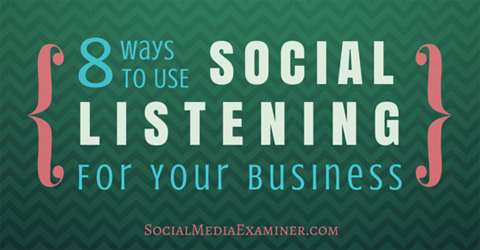
Listen to this article:
Where to subscribe: Apple Podcasts | Spotify | YouTube Music | YouTube | Amazon Music | RSS
With a little time and creativity, you can go beyond just monitoring your brand and use social listening to enhance content marketing, business development, product management, human resources and customer support.
Here are eight ways social listening can benefit your business.
#1: Generate Leads by Solving Problems
One way to find new business opportunities is to monitor keywords that relate to people's problems and needs or their frustrations with a competitor's product.
Monitor terms like “[competitor's brand name] can't” or “[competitor's brand name] won't” to identify pain points.
Once you identify these potential customers, reach out to them. Ask them what their expectations are for the product and where it's falling short. Then explain your product's benefits and added value, and make yourself available for questions. You may also want to provide a demo of your product.
#2: Attract New Customers
To generate new leads for your business, brainstorm for keywords that people might use when researching a product and track these terms across forums and social groups.
Join the conversations and find out more about any potential customers' needs and expectations. Be genuine in your interactions.

Later, check your database to see if anyone from the forum signed up to try your product. Send those new customers an email offering to personally help them get started.
Get World-Class Marketing Training — All Year Long!
Are you facing doubt, uncertainty, or overwhelm? The Social Media Marketing Society can help.
Each month, you’ll receive training from trusted marketing experts, covering everything from AI to organic social marketing. When you join, you’ll also get immediate access to:
- A library of 100+ marketing trainings
- A community of like-minded marketers
- Monthly online community meetups
- Relevant news and trends updates
#3: Identify Influencers and Advocates
After a big product launch or update, track the link to or the title of your press release to see who's sharing it. This information helps you identify influencers in your industry. Reach out to them to start building relationships.
You'll also want to identify your biggest brand advocates. Find and reward them with giveaways or special offers. Continue to keep them engaged as your brand grows, because satisfied customers are one of your greatest marketing resources.
#4: Discover Where Your Community Hangs Out
Social listening enables you to find out where your potential and current community members carry on important conversations—Twitter, Facebook, Quora, comments on blogs or somewhere else. Track these conversations, and when the time is right, join in.

#5: Improve Customer Care
With social listening, you can instantly identify both positive and negative feedback.
Monitor your brand name with and without the @ symbol (many people forget to add the @ symbol when communicating on Twitter).
Also, track common auto-correct misspellings for your brand name and monitor your website mentions (for example, www.yourbrand.com and yourbrand.com).
This gives you the opportunity to show your appreciation for positive comments or to find and respond to disappointed customers, turning potentially negative experiences into positive ones. If people take the time to write about issues with your product, they're open to your help.
#6: Get Feedback on Products
Social listening also helps you identify potential issues early in a product's life cycle.
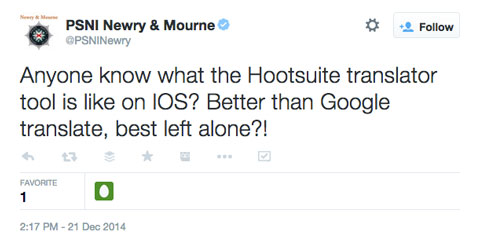
Track your brand name's mentions and if someone posts a bug about your product, assign the issue to your development team so it can be fixed as quickly as possible.
Then, respond directly to your customer to nurture transparency. If feasible, use your personal email account rather than your company account to show the human side of your business.
#7: Find Top Talent
Your human resources department can benefit from social listening, too. Hiring top talent is frequently a challenge, but tracking conversations in forums, in social groups or on blogs can help you identify key candidates with remarkable skill sets.

Discover Proven Marketing Strategies and Tips
Want to go even deeper with your marketing? Check out the Social Media Marketing Podcast! Publishing weekly since 2012, the Social Media Marketing Podcast helps you navigate the constantly changing marketing jungle, with expert interviews from marketing pros.
But don’t let the name fool you. This show is about a lot more than just social media marketing. With over 600 episodes and millions of downloads each year, this show has been a trusted source for marketers for well over a decade.
#8: Drive Innovation
Asking your customers what they want, as tempting as that might be, can result in skewed answers, misinformation, and potentially, failed products.
Henry Ford famously said, “If I'd asked my customers what they wanted, they'd have said a faster horse.” It's often easier for people to comment on something that is in front of them than to imagine something that doesn't exist.
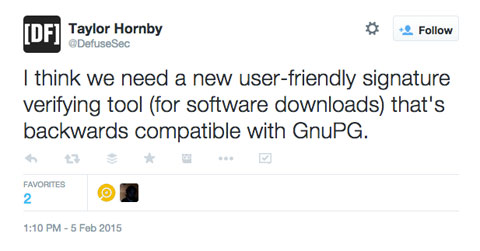
With social listening, you don't have to ask people what they want; just listen in on their conversations and use these insights to figure out what they need.
Tools to Monitor Your Brand Reputation
Google Alerts is a powerful tool for tracking your brand's mentions, trends and other interesting topics across the internet. To create an email alert, type in your company's name or the keyword you want to monitor. You can even use advanced operators in the search box for better results, just like you would in Google Search.
Quora is another free resource to track what people are saying about your product or other relevant topics. However, you can only monitor those mentions within the site itself. Search for specific questions or topics related to your target market's needs and follow those relevant to your business. You'll receive updates in your Quora feeds and notifications by email.
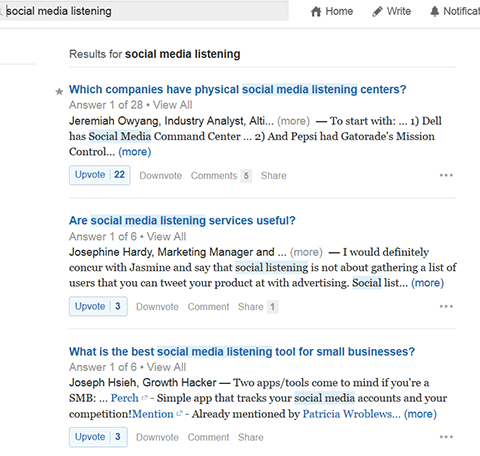
Twitter Advanced Search is often overlooked, but it's a valuable tool for refining Twitter search queries and zeroing in on the people talking about your brand or competing brands. You can use operators—and exclusion operators—to filter your results. There are also options for targeting a specific group of people or a geographic location.
Social Mention works in a similar way to Twitter's Advanced Search, except you get the results from all over the social media space, in addition to Twitter. To get started, enter the keywords or topic you want to search and select the type of results from the drop-down menu. Use the advanced settings for more filtering options like geo-location and language. On the results page, your influence score is divided into four categories: strength, sentiment, passion and reach. You can also see your top keywords and brand advocates. (Editor's Note: Social Mention is no longer an active online tool.)
Tools to Create a Keyword List
Rather than just compiling a list of keywords by trial and error, use tools like these to make the process quicker and easier.
Keyword Tool gives you keyword ideas based on what people type into the Google search box. For example, want to track conversations about “social monitoring,” you may see suggestions like “social monitoring software” or “social monitoring service.”
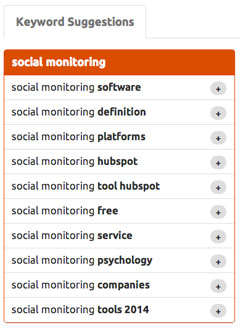
Google Trends analyzes search queries, looks at the number of searches for keywords and shows how trends evolve so you can find out how people search for your brand or competing brands. You can compare trends by adding a second search term, plus it suggests a list of related search topics you might add to your keyword list.
Get More Out of Social Listening
Social listening goes well beyond just monitoring your brand's reputation. You can use social listening insights to improve many aspects of your business, including business and product development, human resources and customer care.
Now you need to find out how to make social listening work for your business. If you're interested in how to build a social listening dashboard, be sure to check out this article.
What do you think? How are you using social listening to improve your business? Please share your thoughts and tips in the comments below!
Lead to customer photo and Website and internet icons photo from Shutterstock.
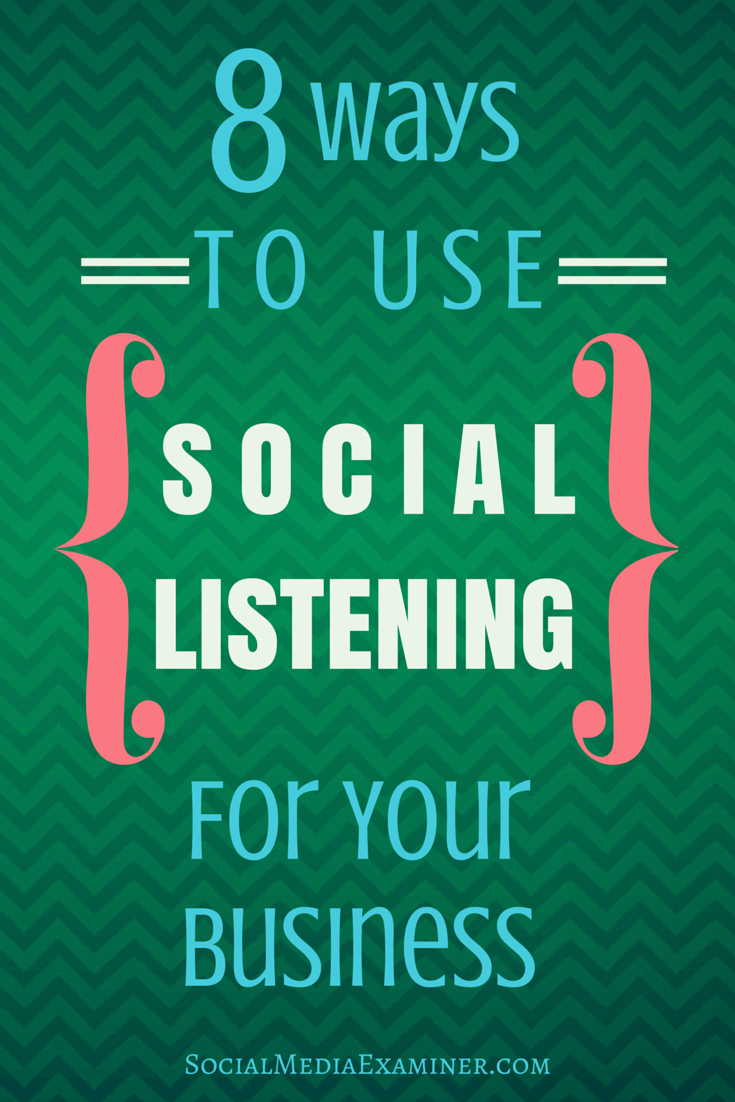
Attention Agency Owners, Brand Marketers, and Consultants

Introducing the Marketing Agency Show–our newest podcast designed to explore the struggles of agency marketers.
Join show host and agency owner, Brooke Sellas, as she interviews agency marketers and digs deep into their biggest challenges. Explore topics like navigating rough economic times, leveraging AI, service diversification, client acquisition, and much more.
Just pull up your favorite podcast app, search for Marketing Agency Show and start listening. Or click the button below for more information.

